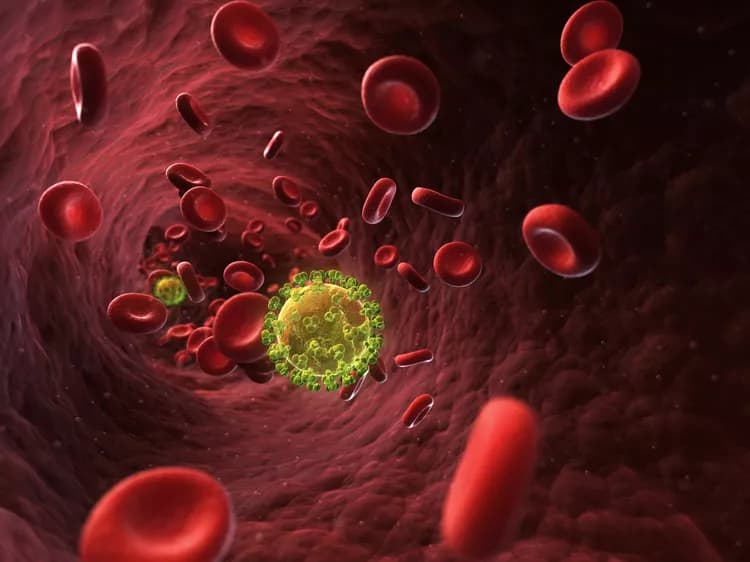
Gold 'Nanoprobes' Used To Track Blood Flow In Tiny Vessels
Scientists have designed gold nanoparticles, no bigger than 100 nanometres, which can be coated and used to track blood flow in the smallest blood vessels in the body.
By improving our understanding of blood flow in vivo the nanoprobes represent an opportunity to help in the early diagnosis of disease.
Light microscopy is a rapidly evolving field for understanding in vivo systems where high resolution is required. It is particularly crucial for cardiovascular research, where clinical studies are based on ultrasound technologies which inherently have lower resolution and provide limited information.
The ability to monitor blood flow in the sophisticated vascular tree (notably in the smallest elements of the microvasculature -- capillaries) can provide invaluable information to understand disease processes such as thrombosis and vascular inflammation. There are further applications for the improved delivery of therapeutics, such as targeting tumours.
Currently, blood flow in the microvasculature is poorly understood. Nanoscience is uniquely placed to help understand the processes happening in the micron-dimensioned vessels.
Designing probes to monitor blood flow is challenging because of the environment; the high protein levels in plasma and the high red blood cell concentrations are detrimental to optical imaging.
Conventional techniques rely on staining red blood cells, using organic dyes with short-lived usage due to photobleaching, as the tracking motif. The relatively large size of the red blood cells (7-8 micrometres), which are effectively the probes, limits the resolution in imaging and analysis of flow dynamics of the smallest vessels which are of a similar width.
Therefore, to have more detailed resolution and information about the blood flow in the microvasculature, even smaller probes are required.
This paper, published in Nanomedicine, reports a method for the preparation of iridium-coated gold nanoparticles as luminescent probes for optical imaging in blood.
Professor Zoe Pikramenou, from the School of Chemistry at the University of Birmingham, explained, "The key to these iridium-coated nanoparticles lies in both their small size, and in the characteristic luminescent properties. The iridium gives a luminescent signal in the visible spectrum, providing an optical window which can be detected in blood. It is also long-lived compared to organic fluorophores, while the tiny gold particles are shown to be ideal for tracking flow and be detected clearly in tissues."
The team was able to stabilize water-soluble gold nanoparticles, coated with the iridium luminescent probes -- at up to 100 nanometres in size using a surfactant coating.
Professor Gerard Nash, from the Institute of Cardiovascular Sciences at the University of Birmingham, added, "The size of 100 nanometres is ideal for not disturbing the flow, yet still being detectable by high resolution imaging using conventional microscopes. These nanoparticles can be used as trackers for detection in sub-millimeter channels of dimensions similar to many microvessels with higher resolution than fluorescently-stained blood cells."
Professor Stuart Egginton commented, "The nanoparticles enter blood circulation and can be clearly imaged by fluorescence in different organs, while the gold signal can be easily quantified by other techniques."
The team will now look to develop the nanoparticles to allow for targeted delivery within the body, and investigate the potential for in vivo imaging using near infrared probes.
Materials provided by University of Birmingham. Note: Content may be edited for style and length.
Disclaimer: DoveMed is not responsible for the accuracy of the adapted version of news releases posted to DoveMed by contributing universities and institutions.
References:
Nicola J Rogers, Hannah C Jeffery, Sunil Claire, David J Lewis, Gerald Zikeli, Nikolas J Hodges, Stuart Egginton, Gerard B Nash, Zoe Pikramenou. (2017). Tailoring iridium luminescence and gold nanoparticle size for imaging of microvascular blood flow. Nanomedicine. DOI: 10.2217/nnm-2017-0211
Related Articles
Test Your Knowledge
Asked by users
Related Centers
Related Specialties
Related Physicians
Related Procedures
Related Resources
Join DoveHubs
and connect with fellow professionals

0 Comments
Please log in to post a comment.